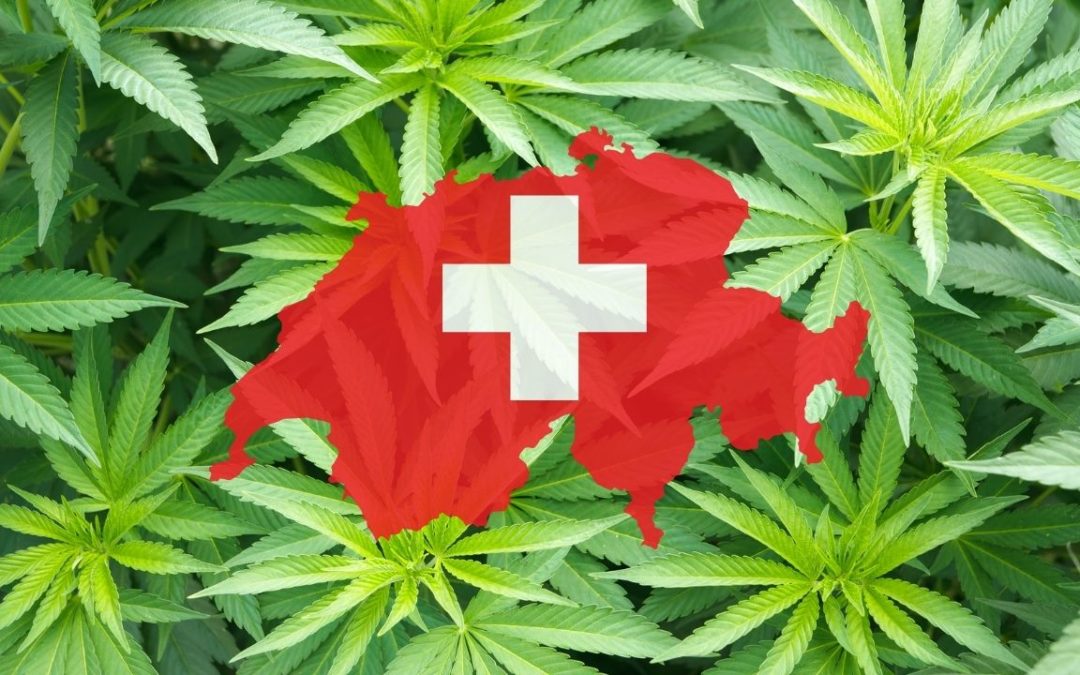Sommaire
The CBD industry in Switzerland is growing at an ever increasing rate. According to Tages-Anzeiger, CBD brought in about 60 million Swiss francs to the country in 2017. By 2027, the market is expected to reach 320 million Swiss francs. Switzerland is the best place to enter the European cannabis market.
But why? In this article, you will learn what makes Switzerland an exciting country for companies in the cannabis and CBD industries looking to enter the European market. You will also learn many facts about Swiss CBD.
Swiss Convention on Biological Diversity: The only country/region with a 1% THC threshold
Let’s start with the basics. Is CBD legal in Switzerland? The answer is yes, the Convention on Biological Diversity is legal in Switzerland. It is legal in most European countries. Cannabidiol itself is not prohibited under Swiss drug law. As you know, CBD comes from the hemp plant, and depending on the THC content, the same law may or may not prohibit it. As a general rule, according to the Swiss Convention on Biological Diversity Act, the legality of the consumption, cultivation and sale of products derived from cannabis plants is determined by the THC content. If the THC content of the plant is less than 1%, it is legal. If the cannabis plant contains more, this is not the case. The 1% THC threshold is unique in Swiss law. In most European countries, the limit is 0.2%. So why is it 1%? This allows the plants to reach their full potential and thus develop the best medicinal properties.
The government considers the positive properties of CBD as a potential drug. Switzerland is perhaps the most advanced country in Europe in terms of consumer legislation for the Convention on Biological Diversity.
The Swiss will not copy the existing legislation, but will dare to try, explore and push the limits to use the full potential of these cannabinoids. For businesses, it is important that the government not only supports your industry, but also helps it to grow sustainably in a safe and regulated environment. In terms of regulation, there are a few points to mention: Selling, using, manufacturing or possessing marijuana with a THC content of more than 1% is considered a criminal offense and (depending on the violation) is punishable by three years in prison.
In addition to this restriction, other rules apply. For example: Like alcohol or tobacco, you must be at least 18 years old to purchase CBD products. If you’re a business, cannabidiol products mean you can’t make a clear promise of a cure.
In Switzerland, driving under the influence of CBD is prohibited, but the Federal Office of Public Health advises against it. The problem with driving in Switzerland under the influence of some CBD products is that you may soon exceed the legal limit of THC, which is 1.5 micrograms per liter of blood. Zero tolerance for drugs on the road. Therefore, consuming some CBD products may cause you to exceed the tolerance level.
However, according to the World Health Organization, the Convention on Biological Diversity is not a drug. All CBD products do not contain THC. The term “full spectrum cannabis product” refers to a product that contains many cannabinoids that have a high concentration of CBD and a low concentration of tetrahydrocannabinol.
If you buy products containing isolated CBD, this rule does not apply. This means that you can use THC-free CBD products every day without worrying about driving or engaging in other regulated activities that would exceed legal limits. For example, Charlotte’s Web recently launched a new CBD oil called “CBD isolate oil” (CBD oil without THC).
Swiss CBD: medical marijuana, when?
Does Switzerland make full use of marijuana for medical purposes? The answer is no. At least not yet. Currently, the Swiss do not have an official medical cannabis plan. The law (July 2011) allows doctors to prescribe medical marijuana, and only patients have special permission from the Federal Office of Public Health. Patients with this type of licence may use cannabis products such as cannabis oil, tinctures or synthetic products (such as dronabinol). Cannabis in flower or resin form cannot be used for treatment. That is the theory. The reality is different.
The FOPH estimates that 70,000 to 100,000 people used cannabis as a drug in Switzerland in 2017, while only 3,000 people held such a license. Usually, this authorization is only granted to seriously ill patients. Each patient’s condition is assessed and treated individually, which makes the whole process very slow. The reality is that very few people can use it. The good news is that the Swiss government is aware of this situation and is taking action. The Home Office is tasked with amending this law by summer 2019. But what does this mean for the industry?
This shows the world that Switzerland is not afraid to innovate and try different things. She is open to the medicinal potential of cannabis and CBD. These clear signs show that the market has all the conditions for continued prosperity and development. Usually, these decisions and laws take some time to unfold and implement. However, this is because they are intended for long-term use. Fortunately, we are living in a new era of cannabis.
CBD Switzerland: Growing CBD, one of the few countries where you don’t need a license
Cannabis production was legalized in August 2016. As long as the plant does not exceed the legal limit of 1% THC, it is legal to grow CBD in Switzerland, i.e. no license to grow CBD in Switzerland is required. In theory, anyone can grow their own CBD hemp plants at home. There is no doubt that Switzerland is an ideal place for foreign companies wishing to enter the European cannabis market to establish a cannabis business in the country. While you still need to take all the necessary steps to start a legitimate business, you can save time and effort without having to obtain a growth license.




